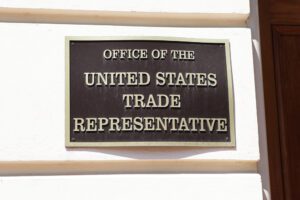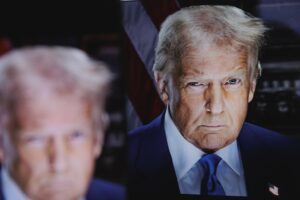WITA’s Friday Exchange Podcast:
Former Trade Negotiators Discuss This Week’s Tariff And Trade Developments
Former trade negotiators discuss tariff and trade developments around the globe.
No one understands the dynamics with key U.S. trading partners better than the people who led these kind of difficult trade negotiations for the United States. WITA’s Friday Exchange brings you in the room with former trade negotiators and trade leaders to update our subscribers on the latest tariff and trade news; what remains undone; and what are expected next steps in these negotiations.
Featured Speakers:
Introduction: Kenneth Levinson, CEO, Washington International Trade Association
Wendy Cutler, Senior Vice President, Asia Society Policy Institute; former Acting Deputy U.S. Trade Representative, Office of the U.S. Trade Representative
Mark Linscott, Senior Fellow, Atlantic Council; former Assistant U.S. Trade Representative for South and Central Asia/WTO and Multilateral, Office of the U.S. Trade Representative
Daniel Mullaney, Non-Resident Senior Fellow, Atlantic Council; former Assistant U.S. Trade Representative for Europe and the Middle East, Office of the U.S. Trade Representative
Moderator: Joe Damond, Chair of International Trade Policy and Global Life Sciences, Crowell Global Advisors; former Deputy Assistant U.S. Trade Representative for Asia and Pacific, Office of the U.S. Trade Representative
Watch the Video on YouTube | Listen on Spotify or Apple Podcasts
Recorded at 3:00 PM ET on 08/13/2025 | WITA
USMCA Update with the Coalition for North American Trade
On August 12, WITA welcomed the three co-chairs of the Coalition for North American Trade as they discussed the latest in U.S. trade with Mexico and Canada, how any August announcements would impact the USMCA review, and explored what next steps could be taken toward building positive momentum for a renewal of the landmark agreement between the three countries.
Featured Speakers:
The Honorable Kevin Brady, Senior Consultant, Akin; former Chairman of the House Ways & Means Committee
Kenneth Smith Ramos, Partner, Agon; former Mexican Chief Negotiator for the USMCA, Office of the Secretariat of the Economy
Steve Verheul, Principal, GT&Co Executive Advisors; former Special Advisor, Trade Policy, Canada’s Deputy Minister of Finance
Moderator: Andrea Durkin, Vice President for International Policy, National Association of Manufacturers
Watch the Full Event Video Here
08/12/2025 | WITA
Reflections on the angels on the head of Jamieson Greer’s pin
On August 7, Ambassador Jamieson Greer published an op-ed titled “Why We Remade the Global Order” explaining how the Trump Administration is reshaping the world economic order. Read the op-ed here. In the following piece, Maria Pagan, a former Deputy USTR, offers some reflections on Greer’s essay.
Amid the flurry of trade activity and just one day ahead of President Trump’s 1 August tariff deadline, U.S. Trade Representative Jamieson Greer issued a statement titled “President Trump’s Vision for a New System of International Trade”. In it, and in a New York Times op-ed a week later, the USTR lays out a defense of U.S. trade policy as accomplishments that expand market access for U.S. exporters, defend critical American industries, create jobs and manufacturing investments, and reassert American leadership.
“Global trade is now being organized around the principles of fair and balanced trade, all pursued in support of countries’ economic and national security,” Greer writes in his statement. In his Times op-ed, he adds, “This is not the time to debate how many angels can dance on the head of a pin,” meaning wasting time on debate when urgent matters are at hand.
Now, having seen the results of Trump’s latest executive orders on “reciprocal” tariffs, the Brazil tariffs, and the India tariffs, among others, you might conclude that the vision Greer sees appears quite at odds with the prevailing one in many parts of the rest of the world: of chaos and contradictory and self-defeating goals in U.S. trade policy.
Maybe I am being optimistic in finding comfort that someone in the administration is at least trying to put some sort of organizing thought, a structure, to what is happening to define what a “system of international trade” should be. The USTR concedes that the “system” is still inchoate: “In the coming weeks, this new system will begin to take shape, as the Trump Administration works with trading partners on a common path to shared prosperity.”
08/12/2025 | Maria L. Pagan | Hinrich Foundation
A Tariff Waiting Game
Ever since President Trump launched his protectionist tariff agenda at the outset of his administration, economists have offered a common plea to other countries: do not retaliate. This wisdom must often contest with the impulsive political pressures of trade wars, and yet it is the soundest economic path. Politicians often believe that retaliatory tariffs place a burden on the foreign country that picked the fight. Retaliatory tariffs tax your own population by burdening them with higher prices and fewer consumer choices. The actual result, however, is akin to imposing a blockade on your own ports to spite an adversary who chose to do the same to their ports. This strategy seldom ends the trade war though, because the bulk of the resulting economic pain is self-inflicted.
Trump’s early targets largely ignored the counsel of economists to forego retaliation. Canada, then in the midst of an election campaign, imposed countervailing duties on American goods as its Liberal government sought to project an image of strength in the face of international bullying. Trump responded by doubling down. The situation with China rapidly devolved into a retaliatory standoff with threatened US rates on Chinese imports reaching 145 percent, and China’s countermeasures increasing to 125 percent. Both sides de-escalated from this brink in May, but only partially. The US now imposes a 30 percent tariff on most Chinese imports, whereas China now taxes American goods at 10 percent—substantial hikes over the single-digit rates that prevailed in the 2010s.
Until last week, it appeared that the 27-member European Union was about to join the retaliatory trade war. With Trump threatening a 30 percent tariff on European goods, EU leaders floated the idea of invoking their “Anti-Coercion Instrument” (ACI)—an aggressive suite of retaliatory tariffs, export and import controls on the US, intellectual property restrictions, and limitations on American investors in Europe. Suddenly, on July 28, Trump appeared to pull a rabbit out of his hat by announcing a sweeping trade deal. According to the White House announcement, the EU would accept a 15 percent US tariff on European goods, or half the threatened rate, but also significantly higher than the average 1.47 percent duty that existed before Trump started his trade war. Pre-Trump EU rates on American goods were even lower, sitting at about 1.35 percent before Trump’s term, but the White House now claims that Europe will further reduce these mostly vestigial levies on a small number of products.
The US-EU announcement sent shockwaves around the political press. Trump declared “victory” over the Europeans. French officials raged at the outcome, calling on Brussels to reverse course and deploy the retaliatory ACI. Other European leaders seemed resigned to the fate of accepting higher American taxes on their exports, calling it the least-bad outcome. On the American side of the debate, some tariff-skeptics reacted with surprise, even suggesting that Trump’s tactics had upended conventional wisdom about trade wars. Oren Cass, the protectionist lawyer who runs the “New Right” think tank American Compass, appeared to be confused by the development even as he celebrated. Cass declared on a podcast that the EU’s unexpected turn away from retaliation somehow disproved all of the economists who had been pleading with the EU to resist retaliation.
Surprisingly few commentators have paused to examine the underlying strategy that led to the US-EU tariff de-escalation. Almost all sides of the debate have accordingly missed a subtler lesson, one related to legal and institutional dynamics at play.
08/07/2025 | Phillip W. Magness | Independent Institute
WITA – We put the community in trade community.
Information about upcoming WITA and trade community events






